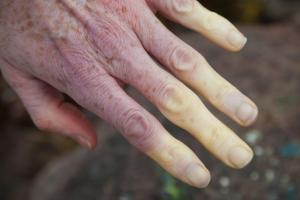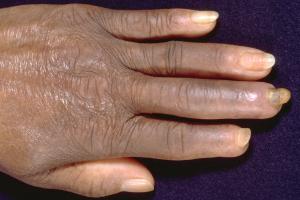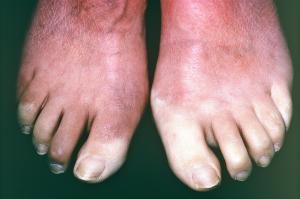Raynaud's
Raynaud's phenomenon is common and doesn't usually cause any severe problems. You can often treat the symptoms yourself by keeping warm. Sometimes it can be a sign of a more serious condition.
Symptoms of Raynaud’s
Raynaud's affects your blood circulation. When you're cold, anxious or stressed, your fingers and toes may change colour.

The skin on your fingers or toes may:
- turn white as blood flow is restricted
- turn blue as blood vessels react
- turn red as blood flow returns


Other symptoms can include:
- pain
- numbness
- pins and needles
- difficulty moving the affected area
Some people also find their ears, nose, lips or nipples are affected.
The symptoms of Raynaud's may last from a few minutes to a few hours.
When it can be another condition
There are other conditions that can cause symptoms similar to Raynaud’s:
- resting or sleeping on part of the body can lead to pins and needles that lasts for a few minutes
- hyperventilation can lead to breathing too quickly, trembling hands, pins and needles, but fingers don't change colour
- chilblains can lead to burning or itchy swelling on fingers and toes - it happens after being very cold, gets worse as you warm up
- a clot can lead to only digits on one hand or foot being affected, and not both hands and/or both feet
Things you can do yourself
There are some things you can do and shouldn’t do to help ease the symptoms of Raynaud’s. These include.
Do
- keep your home warm
- wear warm clothes during cold weather, especially on your hands and feet
- exercise regularly – this helps improve circulation
- minimise stress if this is a trigger
- eat a healthy, balanced diet
Don't
- smoke – improve your circulation by stopping smoking
- drink too much tea, coffee or cola – caffeine and other stimulants can stop you relaxing
When to see your GP
You should see your GP if:
- your symptoms are very bad or getting worse
- Raynaud's is affecting your daily life
- you only have numbness/symptoms on one side of your body
- you also have joint pain, skin rashes or muscle weakness
- you're over 30 years old and get symptoms of Raynaud's for the first time
- your child is under 12 years old and has symptoms of Raynaud's
If your symptoms are very bad or getting worse, your GP may prescribe medication to help improve your circulation.
Some people need to take the medication every day. Others only use it to prevent Raynaud's – for example, during cold weather.
Sometimes your GP will examine you and suggest a blood test. In rare cases, Raynaud's could be a sign of a more serious condition, such as rheumatoid arthritis or lupus.
More useful links
The information on this page has been adapted from original content from the NHS website.
For further information see terms and conditions.